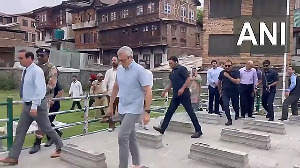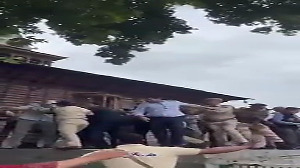We can boast of being a nation on the threshold of superpower status. We can thump our chests with pride at the increasing importance accorded to India on the world stage and we can feel confident about our growing fiscal prosperity.
But the true refinement of a society is judged by its ability to deliver simple justice to all its citizens especially the weakest, the under privileged and the unconnected among its fold. The Ruchika Girhotra case is a reality check that brings us hurtling down to earth from the dreamy fantasy of cloud nine.
Justice is not a chimera that can be materialised out of thin air by the sleight of a magician's hand. Neither is it a concept that can be imposed from above by a gubernatorial diktat or one that flows automatically and freely from the portals of a judiciary.
It is an aggregate function of a society; the sum total of our morals and convictions and our courage and ability to execute them. Injustice flourishes in a milieu which is of our own making: a product of our own frailties, our indifference to the plight of others, and our own base desire to protect our own selfish interest at the cost of ethical norms.
To ascribe the shameful miscarriage of justice in the Ruchika tragedy purely to bureaucratic abuse of power, illicit political equations and defective government oversight is to take a narrow simplistic view of the entire episode and smacks of escapism. By this blame game we, as a society hope to absolve ourselves of the responsibility that we chose to shirk. What this unholy incident highlights is an all round failure of mammoth proportions in which nearly every facet of our society colluded intentionally with the perpetrator to wrongfully condemn the victim.
It is a classic example of how a depraved individual in a position of authority can commit a vile act and then misuse his subordinates, intimidate ordinary members of society and exploit his political connections in an attempt to camouflage his transgression. But even more depressing and shocking is the tacit compliance of the bureaucracy, the political leadership and members of society, all of whom were willing accomplices to this crime, some inadvertently by acts of omission and others more directly by acts of commission.
Hannah Arendt coined the phrase the 'banality of evil' in her book, Eichmann in Jerusalem: A Report on the Banality of Evil to explain the mechanism of immorality and its unchecked path in Nazi Germany. Thoughtlessness and indifference by common folk contributes to evil was her surmise. Adolf Eichmann was Hitler's operational executive in charge of the mass deportation and execution of Jews. In his defence, he had contended that he was merely following orders.
The Yale psychologist Stanley Milgram after a series of laboratory experiments corroborated Arendt's view point: "After witnessing hundreds of ordinary people submit to authority in our own experiments, I must conclude that Arendt's conception of the banality of evil comes closer to the truth than one might dare imagine : ordinary people, simply doing their jobs, and without any particular hostility on their part, can become agents in a terrible destructive process."
That seems to have been the case in the Ruchika case as well. While the scale of evil may vary between Nazi Germany and the Ruchika case, the course of events are strikingly similar to some extent: common folk and officials following orders or conforming to the establishment abetted the crime.
Within a month of this atrocious incident that occurred on August 12, 1990, Rathore's guilt had been established by an internal inquiry conducted by Director General of Police R R Singh and a report submitted to the then Home Secretary J K Duggal with the recommendation that a FIR be filed.
The report stated: "In this case I am of the considered view that whatever Ruchika a small girl of 15 yrs had stated about the molestation by SPS Rathore is based on true facts. I am of the opinion that a cognisable offense is made, therefore, recommend that a case under appropriate sections of Indian Penal Code be got registered."
Duggal concurred with the report. But yet an FIR was not filed; instead the authorities adopted delaying tactics, presumably as a result of political pressure, vacillating between departmental action and criminal indictment with no legitimate action being taken for over eight years. A CBI inquiry was ultimately ordered in August of 1998.
The million dollar question that springs to your mind is that when high ranking officials, a DGP and state home secretary were convinced of Rathore's guilt, why did they not pursue the case to its logical conclusion?
To ascribe their lapse to threats of physical violence or political intimidation will not pass muster. As top officials of a government they were expected to carry out their duties regardless of extraneous considerations or personal interest, which they did not. We can have the best laws on paper, but they will all come to naught if the human strength to implement them is lacking.
Then we have Rathore's subordinate officers who foisted fraudulent cases against Ruchika's brother in order to pressurise Ruchika to withdraw the case. Could they have refused to become a part of his vendetta?
One thing is clear: the establishment failed her. The political leadership not only looked the other way but showered Rathore with medals and promotions while he continued with his evil campaign. But did society fail her as well? Did the school that she had attended for 12 years succumb to pressure and expel her, adding to her woes and possibly her ultimate demise?
The media in a free society cannot be content to see itself as a mere chronicler of events. It plays an important role as a guardian of moral values. It is gratifying to note the rise of public vigilantism in recent times. Media focus and public outrage helped bring the murderers of Jessica Lal to justice. But in instances where possible the media and society must play a proactive role. Prevention is better than remedy. Could a more involved society and a proactive media have averted Ruchika's death by speeding up the pace of justice and by effectively highlighting Rathore's misdeeds?
Evil is a coward that preys on the timidity of the weak but retreats in the face of the slightest resistance. All that was necessary was a single person to throw a monkey wrench into this evil works and this satanic march of injustice would have grounded to a halt. But alas there was none.






